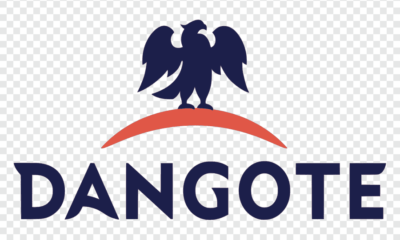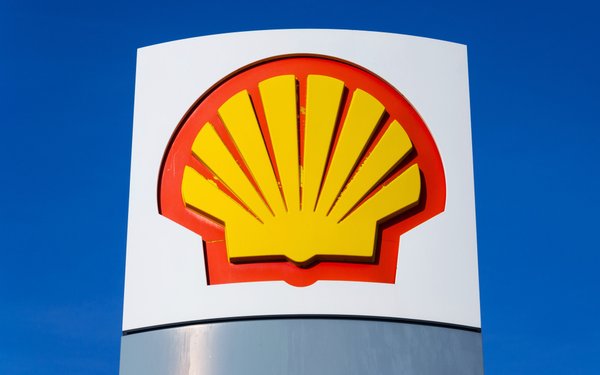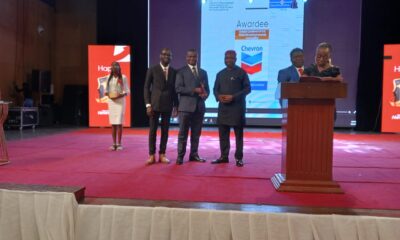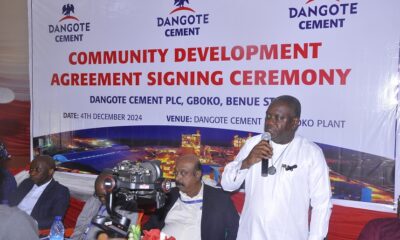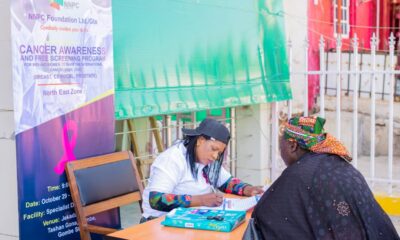Business
Dangote Cement Gboko Commits To Host Communities’ Sustainable Dev’t

The management of Dangote Cement, Gboko Plant has declared that its host communities are critical stakeholders in its business operations and, as such, their developmental needs are given high priority.
This was revealed by its Gboko Plant Director, Louis Raj, who also emphasised the company’s unwavering commitment to the infrastructural and socio-economic development of the host communities.
ALSO READ: Dangote Cement Unveils New Students’ Internship Scheme
According to Raj, every segment of the host communities would benefit from the social investments being made by the company.
He was addressing a recent report alleging neglect of the communities, and clarified that the cement company has always fulfilled its Corporate Social Responsibility (CSR) commitments by keeping to a robust, mutually beneficial relationship with community members.
Raj noted that the company has been diligently implementing the Memoranda of Understanding (MOUs) with the host communities and has extended its CSR efforts to include sustainable environmental practices, capacity building, and infrastructural development.
He further stated that the Gboko Cement Plant operates in full compliance with environmental and other government regulations.
“It is on record and verifiable that all government agencies responsible for industrial ecological assessment have periodically visited the Gboko Cement Plant and certified that it operates within approved industrial environmental limits. The Federal Ministry of Environment, Benue State Agency of Environment, National Environmental Standards and Regulations Enforcement Agency (NESREA), and other oversight agencies can attest to these claims.
“Whenever an incident of ecological concern arises, the company takes prompt action to ensure proper remediation, and, in some cases, provides appropriate compensation to affected community members,” said Raj.
He revealed that the company had contributed to alleviating water crises in several communities, even those beyond its immediate host areas.
Over the years, the DCP Gboko plant has installed more than 50 hand-pump and motorised water boreholes across various settlements. Of these projects, 17 have been executed in the Mbayion clan, benefiting the immediate host communities of Amua, Tse-Kucha, and the Quarry Community.
Raj also noted that the company is currently constructing additional motorised water boreholes and is in the process of installing pumps and 30,000-liter capacity steel overhead water tanks for these communities.
He noted that, “In response to a request from the Tse-Kucha community, the company recently repaired the flow valve at the water earth dam that supplies water for various household uses. Additionally, plans have been finalised for a comprehensive rehabilitation of the earth dam, which was originally constructed and donated to the Tse-Kucha community by the then-Benue Cement Company over 30 years ago.
While these community water projects are underway and nearing completion, the company is currently addressing water supply challenges by providing water to households in Tse-Kucha using tanker trucks positioned at strategic locations within the community.”
The Gboko plant director emphasised that Dangote Cement is committed to environmental sustainability and addressing climate change. He highlighted that the company has implemented a robust climate change policy that aligns its operations with global climate goals. As part of the Group’s environmental sustainability programme, the DCP Gboko Plant has initiated a deliberate decarbonization effort, including extensive tree planting across various community settlements.
“We urge all stakeholders of Dangote Cement, Gboko Plant to collaborate with management to ensure ongoing community engagement and dialogue. This will foster a harmonious and peaceful coexistence and create a conducive business environment for the benefit of all,” he added.
Business
Savannah Energy Provides Unaudited FY 2024 Trading Updates

Savannah Energy has shared a trading update on its Nigerian operations and other markets in Africa, including up-to-date cash collections in its Nigerian business.
According to the update, made available on Thursday in Lagos, its gross production in Nigeria averaged 23.1 Kboepd for FY 2024, broadly in line with the prior year’s 23.6 Kboepd, of which 88% was gas (FY 2023: 91%).
On the update, CEO of Savannah Energy, Andrew Knott, said, “I am pleased to provide a FY trading update which demonstrates the continued progress we have made in 2024, a year which saw the highest level of cash collections ever recorded by our Nigerian business. 2025 is expected to be an exciting year for our Company: we have a large planned operational programme in Nigeria which is anticipated to enhance both our oil and gas production levels and capacity; we intend to progress our R3 East oil development project in Niger; we continue to pursue key acquisitions in the upstream oil and gas space; and we continue to seek to build our power business.
“Fundamentally, Savannah remains unequivocally an “AND” company, seeking to deliver strong performance both for the short AND long term across multiple fronts, and pursuing growth opportunities in both the hydrocarbon AND power sectors.”
The update It also shows that it generated a Total Income of US$393.6 million in 2024, compared to FY 2023’s US$289.8 million. This consists of Total Revenues of US$258.7 million and Other operating income of US$134.9 million.
The report also shows that Savannah’s FY 2024 Total Revenues were ahead of the previously issued financial guidance of greater than US$245 million, while FY 2024 financial guidance is reiterated for Operating expenses plus administrative expenses at ‘up to US$75 million’. The company expects its FY 2024 capital expenditure to come in lower than planned (previously guided at ‘up to US$50 million’) due to the phasing of spend.
ALSO READ: CSR: Dangote Awards Scholarships To 473 Students
According to the update, Savannah’s cash collections in 2024 amounted to US$248.5 million, a slight increase from the US$206 million it received in 2023. The report further shows that its cash balances as at 31 December 2024 stood at US$32.6 million, compared to the 31 December 2023 figure of US$107.0 million.
The report shows that the company’s midstream subsidiary, Accugas Limited, had as at 31 December 2024 drawn down on its NGN332 billion of the NGN Transitional Facility, with the resulting funds being converted to US$, which, along with cash held, was used to partially prepay the existing Accugas US$ Facility, leaving a balance as at 31 December 2024 of approximately US$212.3 million.
The report also provided new updates on Accugas’ US$45 million Uquo Central Processing Facility (“Uquo CPF”) compression project in Nigeria, noting that its commissioning which will enable the expansion of gas production in the medium term is well underway.
The report highlighted the progress being made in the procurement process of long lead equipment in Nigeria for a potential two-well drilling campaign on the Uquo Field in H2 2025, with an additional gas development well expected to add up to 80 MMscfpd of supplemental production capacity and a potential exploration well targeting an Unrisked Gross gas initially in place (“GIIP”) of 154 Bscf (25.7 MMboe) of incremental gas resources.
The update shows that progress is also being made in the planned Savannah acquisition of Sinopec International Petroleum Exploration and Production Company Nigeria Limited, whose principal asset is a 49% non-operated interest in the Stubb Creek oil and gas field (“Stubb Creek”), with regulatory approval and completion being targeted in Q1 2025. Following the completion of the acquisition, Savannah intends to commence an expansion programme which is anticipated to increase Stubb Creek gross production from an average of 2.7 Kbopd in 2024 to approximately 4.7 Kbopd.
In Niger, Savannah continues to seek to progress its 35 MMstb (Gross 2C Resources) R3 East oil development in South-East Niger, while it continues to push for a potential alternative transaction structure to acquire a material stake in producing oil and gas assets in South Sudan as previously announced on 20 December 2024.
On the renewable energy front, the update shows that Savannah has up to 696 MW of renewable energy projects currently in motion, including the up to 250 MW Parc Eolien de la Tarka wind farm project in Niger and the up to 95 MW Bini a Warak hybrid hydroelectric and solar project in Cameroon. A firm believer in Africa’s transition to renewable energy, Savannah continues to target a portfolio of up to 2 GW+ of power projects in motion by the end of 2026.
Business
Nigeria Can Achieve 5.5% GDP Growth – NESG
The Nigerian Economic Summit Group (NESG) has projected that the country has the potential to achieve a 5.5% growth in Gross Domestic Product (GDP) if critical policy reforms are sustained.
This was disclosed on Thursday during the launch of the NESG’s 2025 Macroeconomic Outlook report.
Speaking at the event, the Chief Economist and Director of Research & Development at NESG, Dr. Olusegun Omisakin, highlighted the need for more efficient policy implementation to unlock Nigeria’s economic potential.
READ MORE: Davido Is Richer Than His Billionaire Father – Ibrahim Chatta Claims
“We believe at the optimal level, if we embark on more efficient policy reforms, the Nigerian economy has the potential, the GDP to end up at 5.5 per cent, and we believe that this is achievable,” Omisakin stated.
More to follow……….
Business
CBN Approves Release Of Nigerian FX Code
The Central Bank of Nigeria (CBN) has announced the release of the Nigerian Foreign Exchange (FX) Code, a set of guidelines designed to promote ethical conduct among authorized dealers in the country’s FX market.
In a statement, the apex bank disclosed that the official launch of the Code would take place on Tuesday, January 28, 2025, at the CBN Head Office Auditorium in Abuja.
READ MORE: Dangote Denies Culpability In Pumping Up Petrol Price
“The Central Bank of Nigeria has approved the release of the Nigerian Foreign Exchange (FX) Code as a guideline to the banking industry to promote the ethical conduct of authorised dealers in the Nigerian Foreign Exchange Market,” the statement read.
The introduction of the FX Code is expected to enhance transparency, accountability, and professionalism within Nigeria’s foreign exchange ecosystem, aligning it with global best practices.
The event is anticipated to attract key stakeholders in the financial and banking sectors, as well as representatives from authorized FX-dealing institutions across the country.

